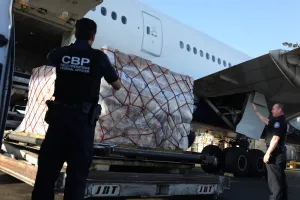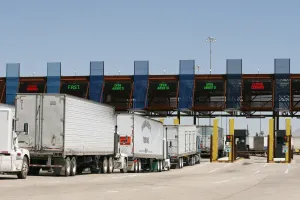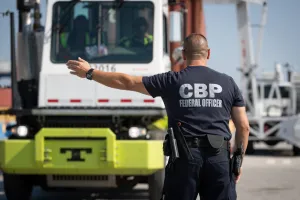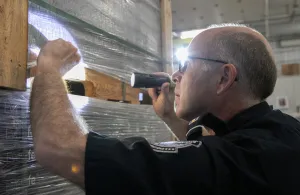By Marcy Mason
Discussions began on a serious note when members of U.S. Customs and Border Protection’s trade advisory committee met virtually for their last public meeting of the fiscal year on Sept. 20. The Commercial Customs Operations Advisory Committee, known as COAC, received a sobering update on the rise in fentanyl seizures.
“CBP’s fentanyl seizures have risen more than 800% since fiscal year 2019, and CBP has seized over 26,000 pounds of fentanyl as of today,” said Troy A. Miller, CBP’s senior official performing the duties of the commissioner, who co-chaired the meeting. “Our officers and agents are dedicated to the mission of seizing illicit drugs and disrupting the supply chains that bring them to our borders and into our communities. But the advent of fentanyl and other synthetic drugs within the past decade has raised the stakes beyond anything we might have predicted when CBP was created just 20 years ago.”
Miller shared that fentanyl is 50 times stronger than heroin and 100 times stronger than morphine. “In the United States, it has contributed to more than 100,000 overdose deaths over the last two years. These tragedies have touched every corner of our country,” said Miller. “Far too many of us have friends, family members, and colleagues who have been affected.”
Miller pledged to combat the fentanyl crisis. “We are deeply committed to disrupting the production mechanisms and supply chains operated by transnational criminal organizations,” said Miller. One common pathway for fentanyl, precursor chemicals, and pill presses to get into the hands of criminals is through small package shipments, especially in the air cargo environment, he explained.
“Due to e-commerce, the volume of these shipments has skyrocketed,” said Miller. “Through August 29th of this current fiscal year, CBP has cleared about 976 million de minimis shipments and is tracking to exceed a billion shipments for the first time ever,” which he noted makes “screening these shipments and ferreting out contraband incredibly challenging.”
Miller also gave an update on CBP’s green trade strategy that was launched in 2022. The strategy incentivizes green trade, bolsters CBP’s environmental enforcement posture, and strengthens enforcement of trade laws related to natural resource crime.
Miller told the audience that CBP hosted its first Green Trade Innovation and Incentives Forum on July 11. “This gathering was a significant milestone in the implementation of CBP’s green trade strategy. The forum jumpstarted a conversation on cross-sectoral opportunities to increase the sustainability of global supply chains and trade flows, which contribute to greenhouse gas emissions worldwide,” said Miller. Over the course of a day, the event drew more than 200 in-person participants and over 750 virtual attendees, representing more than 250 companies, 30 federal, state and local government agencies, and 35 countries.
“Going forward, CBP will continue to establish green trade targets and metrics,” said Miller. “We will also continue to implement green trade programs such as the Truck Manifest Modernization program, an advanced electronic manifest in ACE,” the Automated Commercial Environment, CBP’s cargo processing system.
“The Truck Manifest Modernization program has cut wait times and reduced emissions from idling vehicles,” said Miller. “As a result, average processing times in primary lanes have dropped from two minutes to approximately 30 seconds for more than 90% of the 45,000 to 50,000 trucks released daily.”
In closing, Miller expressed how much he valued the COAC. “At the risk of repeating myself, I cannot stress enough how important COAC is to the success of our mission, especially when it comes to intercepting fentanyl, other dangerous substances, and disrupting criminal supply chains,” he said. “Criminal organizations continue to evolve their smuggling operations, but we are evolving too. COAC is integral to that effort. We must work together.”
Tom West, the U.S. Department of Treasury’s deputy assistant secretary for tax policy, who also co-chaired the meeting, acknowledged the importance of COAC’s work as well. “I appreciate the input and feedback from COAC on what are some of the thorniest issues that we face today, including how to keep goods produced with force labor out of our country. Today’s agenda is full of these issues,” said West. “There are no easy solutions to any of these challenges. You all know that. We know that. But a forum like this helps make sure we have considered everything that we should, and that we’ve heard all of the perspectives that we should be hearing. Rest assured, we value this work, and we take all of the recommendations that you have presented in the past and that you are here to present today into account when the rubber hits the road and we’re making our decisions.”
COAC trade co-chair Brian White, the senior director of customs and trade facilitation at Intel Corporation, spoke about the progress being made. “Earlier today, we engaged in a highly productive discussion with the leadership team, exploring very promising opportunities within the Centers of Excellence and Expertise, the De Minimis Working Group, and the critical issues surrounding forced labor. In addition to these key initiatives, I am delighted to share that our members have had an exceptionally productive quarter,” said White. “We value the unique opportunity that we have as COAC members to advise CBP on the commercial operations. The collaborative spirit and the expertise gathered here today have truly been exceptional in shaping the future of our industry and the trade community.
The meeting also included updates on trade programs and COAC subcommittee work. Twenty-nine recommendations were presented and unanimously passed. The recommendations pertained to forced labor, intellectual property rights, antidumping and countervailing duties, de minimis imports, pipeline modernization, ACE 2.0, passenger air operations, and the United States-Mexico-Canada Agreement.
Announcements were made about the next public COAC meeting that will be held on Dec. 13 in Washington, D.C., and CBP’s 2024 Trade Facilitation and Cargo Security Summit, scheduled for March 26-28 in Philadelphia.
COAC is a 20-member advisory committee established by Congress in 1987. The committee provides advice and recommendations to CBP and the Department of the Treasury on the commercial operations of CBP and trade-related interdepartmental functions. Some of the issues COAC focuses on include enhanced border and supply chain security, international efforts to harmonize customs practices and procedures, import safety, compliance, and modernization and automation processes used to facilitate trade.







